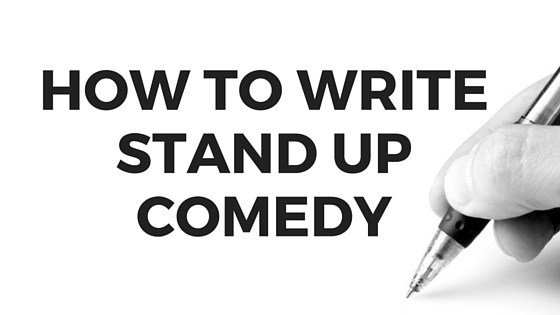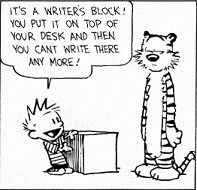HOW TO WRITE COMEDY FOR THE FIRST TIME
WHAT YOU NEED TO KNOW ABOUT WRITING COMEDY
Stand-Up Is Spoken, Not Written
The most important thing you need to know about how to be a comedian is that you are writing for a speech, an informal one at that. The audience will never get to see your writing… in fact, they don’t even care if you wrote anything. All they care about is how funny you are.
Since you’re writing for a speech, make sure your sentences feel natural and you can say them out loud without getting tongue-twisted.
Don’t confuse a tool with its purpose. In stand-up, writing matters only because it helps the performance.
Forget everything you learned in high school English class. Toss spelling and grammar out the window. You won’t need them in stand-up comedy. The more you dive deep into these principles for how to be a comedian that more you’re going to realize that using your natural sense of humor is your greatest strength.
LEARNING HOW TO WRITE COMEDY FOR A SPEECH
With that said, know that writing for a spoken performance will likely be difficult for you at first if you’ve never done it. It takes a few performances to really get use to writing for a speech. As you learn how to be a comedian you’ll get more and more accustomed to this style of writing. When we write, we tend to write out all of our thoughts point-by-point. We’ve been taught to write in complete sentences all our lives.
However, we don’t TALK in complete sentences. This makes the formal writing feel really weird when it’s spoken on stage. It doesn’t feel like a real person.
Notice how you talk with your friends. There are far less segues (“speaking of that…”) and introductory comments (“I’m going to talk about…”) than in writing. When we speak naturally with friends it is very informal and choppy. We use quick sentences that get the point across in as little time as possible. We don’t introduce topics before we say them; we just start talking about it. This should be your goal while you’re learning how to be a comedian as well. The closer your writing matches your natural speech the better.
Not only do we use less segues, but we also use informal words (lexicon) as well….
WRITING | SPEAKING |
What did you say you want to do? | You wanna WHAT?! |
I’d rather have McDonalds | Nah, McDees. |
I wouldn’t have thought about that | I wouldn’t’ve thought it |
I didn’t think about that | I was WAY off… |
I can’t do it because I have something else planned | Can’t. Got other stuff. |
Notice how the sentences on the right are the types of sentences you would actually say while the sentences on the left are what you would be more likely to write. People just learning how to be a comedian find themselves occupying the left-hand column when their writing, even though the right is more natural. This is due to “proper English” being ingrained in you since you were in grade school
Your natural inclination will be to revert back to formal writing. The best way to overcome this is to…
- Listen closely to how you and your friends ACTUALLY speak
- Listen to how veteran comedians deliver lines by watching for half-sentences and use of lexicon/informal words (which is actually harder than it seems because it SOUNDS NATURAL, so no red-flags will go up unless you’re listening for it). You might want to go even deeper and listen to other people how are learning how to be a comedian. You’ll discover that, in general, they use very formal words that sound awkward and unnatural.
- Go through your own material and replace words that come off too formal with lexicon.
HOW TO BE A COMEDIAN: STEPS FOR WRITING COMEDY
For the purpose of this How to Be a Comedian Guide, writing stand-up comedy can be broken down into a few broad steps:
DETERMINE TOPIC
First, determine your topic. This will be your entry point into writing. Best ways to find topics you want to write about is to ask yourself questions like…
- What am I REALLY passionate about?
- What are my pet peeves?
- What’s a story that I love telling friends and has gotten them to laugh in the past?
DETERMINE POINT-OF-VIEW (POV)
Second, determine your POV (Point Of View). Your POV is your unique perspective on the situation, usually with an emotion attached to it. Point-Of-View is almost always included when you create a topic because you’ll already have your own opinions on the topic.
Take the subject of parenting as an example. Many great comedians have talked about their own kinds, their nephews, what they think there kids would be like if they had any, why nobody should have kids, why everyone should have kids… the list goes on. It’s all the same subject, but it’s tackled from different POV’s. Both Louie CK and Ray Romano do long bits about their children, but it comes from completely different perspectives.
COMEDIAN | TOPIC | TOPIC WITH GOOD POV | TOPIC WITH BAD POV | EMOTION |
Louie CK | Children’s Questions | Children don’t stop asking questions! | Children ask a lot of questions | Frustration |
Jerry Seinfeld | Airport food | Airport food is expensive! (as a reaction) | Airport food is expensive. (as a statement) | Disbelief/Frustration Etc. |
Ray Romano | Bugs | My wife thinks I’m the bug killer in the household! | I’m suppose to kill bugs for my wife | Disbelief or Questioning |
Sam Kinison | Refugees | Why do we keep sending them money?! | We send refugees a lot of money | Outrage |
THE DIFFERENCE BETWEEN A GOOD AND BAD POV
Notice that there isn’t much different between a good and bad POV. Bad POV’s state what you want to talk about, they lack emotion. A good POV attaches a strong emotion to the topic, making it far easier to write. Which would you rather write about? “Children ask a lot of questions?” or “Children don’t stop asking questions!” The POV without a strong emotion attached to it doesn’t really give you a good start place, even though it’s almost identical to the good POV. If you find that your material is too factual or just plain boring, it’s most likely because you haven’t found a strong POV. It’s particularly important while you’re learning how to be a comedian that you develop the habit of creating strong POVs. A really strong POV will get you most of the way to your goal.
NOTE: Many times you’ll find step 1 and 2 happen at the same time. When you have both at the same time your material is going to come out sounding far more natural. We’ve broken them down into two separate steps to help new comedians see that there are two important factors you need to have before you start writing. After a few months writing you will naturally blend these two steps together.
Step One: Determine Topic | “Driving” | “Why do I always get stuck in traffic?!” |
Step Two: Determine POV | “I hate traffic” |
You can see from this table that “Why do I always get stuck in traffic?!” isn’t a hard POV to come by on its own. In fact, it’d be far simpler to jump straight to this rather than to think “Ok, I want to talk about traffic” and then thinking “I’d like to take a negative stance on traffic.” While both lead to the same result, combining both steps is far easier and more natural. Plus, the quicker you can jump into writing as soon as you have the inspiration the easier it will get tons of material.
Joke Writing 101: How Joke Structures Work.


